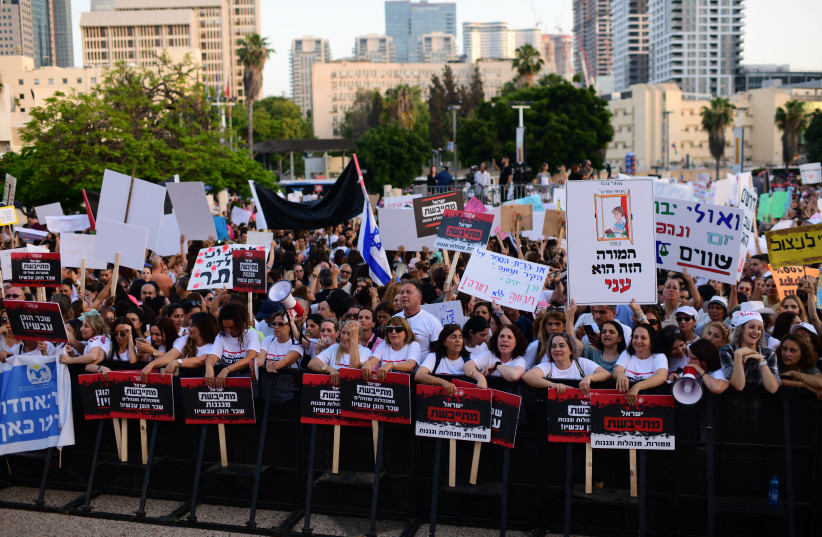Teachers throughout Israel have recently enacted work slow-downs and strikes. Their justification is that the prime ministers – Bennett and Lapid – and Finance Minister Avigdor Liberman and his staff have shown “blatant disregard for salary contracts. This accord is needed to prevent the destruction of the educational system.” Those are the words published recently by the Teachers Union.
The announcement of the Teachers Union explains the relatively high rate of attrition of young teachers: the low pay scale afforded teachers during their first years on the job and the benefits given solely on the basis of seniority without consideration of achievements and excellence.
Without minimizing the value of good salaries and meaningful benefits, research reveals that throughout the world, teachers choose their profession not as an outcome of their consideration of salaries and benefits, but with a focus on fulfillment and empowerment, and the capacity to advance the values they hold dear in an environment that is challenging and productive. This insight affirms that consideration must be given to other issues, alongside the matters of compensation and benefits. We must take into account what happens when teachers who are talented, professional, enthusiastic and driven by a sense of purpose encounter a hardened bureaucratic system. Over the long term, it creates stagnancy and the experience that teaching is a Sisyphean task.
Our natural premise must be that the educational system is shaping the next generation of Israelis, and has to promote social mobility, close gaps and consolidate a shared national ethos. As parents and citizens, we cannot afford to wait for the gradual systemic changes in teachers’ compensation and adaptations in curricula and pedagogy. We must also take a creative and proactive role to nurture personal development and empowerment to sustain the mission of educators, and prevent the burnout and lack of fulfillment.
THE SWIFTEST and most effective way to empower educators is by connecting young teachers with the world of social entrepreneurship and civic activism. We are living in an era of blossoming civic activism in spheres ranging from Israeli heritage and Jewish tradition to environmentalism, Zionism, dialogue among diverse sectors of Israeli society, assisting those in need and aiding special populations, from Holocaust survivors to people with special needs. The NGOs in these fields are characterized by their spirit of renewal, spontaneity and flexibility – qualities that too often are absent in the educational system.

Like all people, teachers have interests beyond their daily work. Their encounter with activism and creative output will be a natural source of enrichment for them. When teachers are engaged with civic activism, they will be able to link their curricula to social ventures or help their students bring to life the connection between their studies and social ventures.
Imagine a history teacher who prepares students for a matriculation exam in the history of Zionism. He or she can delve into the pioneering heritage of the 20th century Hashomer movement and also share his or her voluntarism in the NGO Hashomer Hachadash, or think of a Bible teacher who is an environmentalist and engages students in agricultural celebrations of the holidays, as they are brought to life in kibbutzim and moshavim.
The values of biblical times will be enlivened and made relevant. It is difficult to exaggerate the depth of the influence of such encounters of educators’ consciousness, and its impact on both their self-realization and the way they imbue their students with vibrant and meaningful values.
Strengthening ties between formal and informal ed
This approach also has the capacity to strengthen the ties between formal and informal education, providing teachers with diverse opportunities to challenge themselves, enrich their pedagogical methodologies and apply their professional experience to education in pre-military academies, leadership development programs and other venues.
A significant advantage of building these bridges is enabling educators to develop additional revenue streams. They will be able to create curricula and guide civic organizations in their activism. It will serve as a way to overcome the bureaucratic limitations on opportunities for young teachers. This new venue for professional development will not only stave off the challenge of academic burnout, but also help educators to enhance their income.
In summary: creating ties between young teachers and social ventures is a swift and creative solution to combating the fatigue induced by the system. It will reduce the numbers of teachers who leave the school system and encourage a new trend to improve the quality of education, and the professional and personal experiences of teachers.
This change can only take place through the encouragement of social entrepreneurship. It is our collective duty to call upon social activists to create the necessary platforms for collaboration, building bridges between social activists and educators, and between the formal and informal educational systems.
The writer is the founder of the soon-to-be-launched YESOD Initiative, an accelerator to enable promising young leaders to advance Zionist social initiatives. The program will offer training and skills, and serve as an incubator to address the challenges of Israel in 2022. He is a teacher and a partner in founding and overseeing pre-military academies, young leadership programs in Israel and overseas, and empowerment programs for educators and students.
